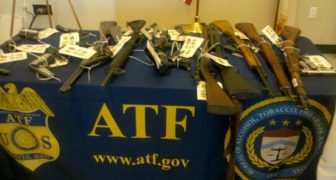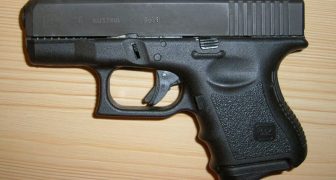This is a guest post by Scott Sylvester
Why you need training…With who…How often?
Let’s face it, money is a driving factor in our day to day lives and the precious few dollars we scrimp, save and stash are hard earned. We invest our time and effort to save money because we enjoy using it to take vacations, purchase high dollar items (like guns) and to better our quality of life with gadgets and gizmos. We should also be investing that money into firearms training?
When standing at the gun counter with a few hundred of your hard earned dollars, the new pistol in the case or rifle on the wall are a lot more attractive than the poster off to the side advertising a local trainer’s upcoming courses. Stacks of hard to find ammo or a new accessory that will make you feel and look more tactical are much more likely to leave the store with us, than a business card for instruction.
I fully endorse investing money into firearms are certain accessories. Firearms are investments and I’ve never lost money on or regretted buying one yet. Looking back I still kick myself for not buying a few guns when I had the opportunity. Adding a new gun to your collection is great, as is adding a light to your gun or a new holster that is more comfortable to carry it in, but how competent are you at using that new gun, new light or new holster? How about adding a new skill to your arsenal instead?Can you access the weapon, draw it, activate the light or laser and then make combat accurate hits quickly? Can you do these things under simulated stress or in a timely enough manner to be effective in saving your life or the life of a loved one? Having the most impressive gun collection isn’t going to save your life. Having the newest model Glock or Remington isn’t going to make you a gunfighter. Putting a laser on your gun isn’t going to help you shoot faster and more accurately. Being able to access your weapon, manipulate the features of the gun and act/react faster than your enemy is what will save you. And you can only perform at the speed of life if you study, prepare, research, and train!
Remember, owning a gun and being able to defend yourself with a gun are two different things. Having a gun in your safe or in a holster doesn’t mean you can fight with it… That is why you need training!
It’s not easy to give away money to a firearms trainer. I struggle with this as well and can’t decide between putting money towards more training or buying a new M&P pistol. In reality, the more I think it over I realize this basic truth: A new gun will not make me a better shooter, or more prepared to protect my family. A training class will…and since I already have a small selection of firearms, it is to my advantage to be the best with what I have, rather than diversify.
Man with One Gun
I’m already a huge subscriber to the “Man With One Gun,” Theory or firearms, which in short states: ‘Beware of the man who only owns one gun… he probably knows how to use it!’ I know we all have a long list of guns we want, but how many firearms do you need to proficient? In my humble opinion, the one gun you have, that you train with, is all you really need. Be it a Sig Sauer, a Glock, a Kahr or a CZ, you need to wield that weapon with unconscious competence. If you can’t, you need training.
Even though I’ve been to hundreds of hours of training in my career and personal life, I always look forward to a course. Sometimes I learn a new skill or a new spin on an old skill which makes tactical and practical sense. I always enjoy the refreshing of the fundamentals and on occasion I get corrected on my stance, grip etc. As we shoot and practice sometimes we don’t do so perfectly and will inadvertently develop subtle bad habits. Having a good instructor watch us shoot can help correct these behaviors and put us on the right track. This will increase the use/ability of the skills you have already developed, prepare you for situations you might find yourself in, and put the gear and guns you carry to real world strain. Trust me, you’d rather have a gear failure on the range, rather than in real life.Now that we have well established reasons of WHY we need training I’m going to address how to find a quality trainer, and the frequency.
Finding a Trainer
When looking for an instructor with whom you are about to invest a couple hundred of your hard earned dollars, you should make sure it is a worthwhile investment. The first thing you need to do is ask yourself, what am I hoping to learn in XXX training class? What skill sets do I have, should I reinforce those skills or am I ready to move on and learn new skills?
If you have never taken a basic pistol course and you own a gun, you owe it to yourself to start with the basics. I know a block of classroom instruction about gun safety, local laws, storage and care of your firearm and the fundamentals of marksmanship doesn’t sound exciting, but believe me, that is THE foundation that every other pistol or rifle skill comes from.
If you are a fairly accomplished shooter and have been trained in the basics, now you can look for more intermediate and advanced course. Once you know what YOU NEED, now you can find an instructor that is capable of teaching those skills. Call your local ranges and local gun stores. Most of them have a relationship with a local trainer, or can at least refer you to a trainer in your area. The internet is a good source of information as well, but not everyone on the internet honesty represents their abilities.
I would also recommend that you look outside your local area. Do a search of within 50 miles or you home to see what other instructors are nearby. A couple hour drive in the car may be worth it to get good quality training in a nearby town, rather than sub-standard training locally. Where the course is being taught is also important so make sure the facility is conducive to the type of training you seek.Once you find an instructor, call them and talk with them. Ask questions about the courses, and tell them what your expectation are. If an instructor doesn’t want to spend a few minutes talking with you he’s not worth your money or time. Sometimes, just based on a conversation, you may uncover a personality conflict which may be an obstacle to your learning.
What sort of experience, background and training does the instructor have and does that align with your learning objectives? There are a lot of military and law enforcement instructors who and phenomenal teachers and shooters, however, the way an infantryman carries and deploys a rifle, may not translate well into how you will use a rifle for home or personal defense.
Does your instructor carry an insurance policy? Although shooting is one of the safest activities, it is good to know your instructor is prepared. Also ask the instructor if they have any medical or trauma training in case there is an accident. When I teach a class for example, I have a small trauma kit with me at all times, and a larger first aid kit for general use. During the safety and life brief I cover how to use the kit in case I’m the one involved in the accident.
Instructors should emphasize safety, safe gun handling, and insist on safety equipment. Having some basic medical knowledge and tools to save a life or deal with trauma is a good sign that the instructor cares about the students.
Lastly, ask about the class size. Again, you are spending your hard earned money so make sure you get the focused instruction you paid for. While you can learn a lot in a class of 15-20 people, how much focused instruction are you really getting from the instructor you are paying? From my own courses I keep them small, no more than 5 students on the range at a time. I want to make sure my students get good focused instruction. If my class exceeds 5, then I hire an extra range safety officer / instructor to make sure we have good safe coverage on the line and there are enough of us ensure each person gets focused instruction.How Often?
I’ll wrap up this week’s article by discussing the frequency of training. This will vary based on the individual desire to learn and your ability to master new skills. Everyone who owns a firearm should attend at least one training course a year. With over 80 million gun owners in the United States, we owe it to ourselves to rehearse safety and maintain competency. Being able to honestly assess your skills will dictate how often you should undertake training.
Anytime your needs change you should take training. For example, you are going from a gun owner, to daily concealed carry. Knowing the fundamentals while a gun owner is insufficient training when working from a holster.
If you transition to a different class of firearm, you should take a course. If all you ever owned was a pistol and now you purchase an AR-15, take a class with that rifle. A basic carbine course will be invaluable to you. Have a rifle and just bought your first shotgun? Take that shotgun to a training course and learn the capabilities, and limits of your new platform.
Regardless of where you train and what you train with, makes sure you sharpen your mind as well. You can have the coolest, most tricked out fancy gun in the world, but if you haven’t thought about self defense scenarios or read up on how your body and mind perform under stress, then you are a tool user. Train until you are a tool master!
As always, be safe and Godspeed.Scott S – Founder, One Weapon Any Tool. Follow him on Facebook and on Twitter: @1weaponanytool
www.oneweaponanytool.com. Next Course: NRA Basic Pistol: March 8th at San Joaquin Rifle & Pistol Range in Linden, CA. A great course for new gun owners, or those interested in purchasing their first gun.


Speak Your Mind